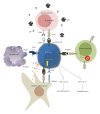Modulatory function of invariant natural killer T cells in systemic lupus erythematosus
- PMID: 22761630
- PMCID: PMC3385970
- DOI: 10.1155/2012/478429
Modulatory function of invariant natural killer T cells in systemic lupus erythematosus
Abstract
Systemic lupus erythematosus (SLE) is a chronic autoimmune inflammatory disease with complex immunological and clinical manifestations. Multiple organ failure in SLE can be caused by immune dysfunction and deposition of autoantibodies. Studies of SLE-susceptible loci and the cellular and humoral immune responses reveal variable aberrations associated with this systemic disease. Invariant natural killer T (iNKT) cells are a unique subset of lymphocytes that control peripheral tolerance. Mounting evidence showing reductions in the proportion and activity of iNKT cells in SLE patients suggests the suppressive role of iNKT cells. Studies using murine lupus models demonstrate that iNKT cells participate in SLE progression by sensing apoptotic cells, regulating immunoglobulin production, and altering the cytokine profile upon activation. However, the dichotomy of iNKT cell actions in murine models implies complicated interactions within the body's milieu. Therefore, application of potential therapy for SLE using glycolipids to regulate iNKT cells should be undertaken cautiously.
Figures

References
-
- Kotzin BL. Systemic lupus erythematosus. Cell. 1996;85(3):303–306. - PubMed
-
- Godfrey DI, Stankovic S, Baxter AG. Raising the NKT cell family. Nature Immunology. 2010;11(3):197–206. - PubMed
-
- Bendelac A, Savage PB, Teyton L. The biology of NKT cells. Annual Review of Immunology. 2007;25:297–336. - PubMed
-
- Wu L, Gabriel CL, Parekh VV, Van Kaer L. Invariant natural killer T cells: innate-like T cells with potent immunomodulatory activities. Tissue Antigens. 2009;73(6):535–545. - PubMed
-
- Miyake S, Yamamura T. NKT cells and autoimmune diseases: unraveling the complexity. Current Topics in Microbiology and Immunology. 2007;314:251–267. - PubMed
Publication types
MeSH terms
LinkOut - more resources
Full Text Sources
Medical

